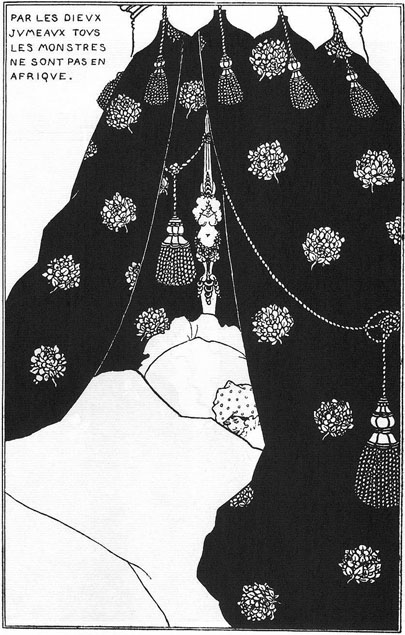
English Art Nouveau Printmaker
1872 - 1898

Aubrey Beardsley was born on 21 August, 1872, in Brighton, England. The family, of middle and upper middle class origins, was often nearly destitute. His father, Vincent, having lost his inherited fortune, worked irregularly at London breweries. Beardsley's mother, Ellen Pitt, provided a slender income by giving piano lessons. Both Beardsley and his sister, Mabel--who later became an actress--were considered artistic and musical prodigies.
The artist's health was always fragile: at the age of nine, he had his first reported attack of tuberculosis, the disease which was to reduce him to an invalid several times and finally cause his death. When in 1884 his mother became too ill to care for him and his sister, they were both packed off to live with an aunt nearby. He attended Bristol Grammar School for four years as a boarder, indulging in his talents by drawing caricatures of his teachers. In 1889, he was sent to London as a clerk in an insurance office. His recovered mother soon followed and remained to nurse her son for the rest of his short life.
Beardsley first published work was "The Valiant", a poem in the June 1885 issue of Past and Present, the Brighton Grammar School magazine. Two years later his first reproduced drawings, a series of sketches, "The Jubilee Cricket Analysis", appeared in the same journal, and he provided the program book illustrations for "The Pay of the Pied Piper", his School's 1888 Christmas entertainment. In 1889 his prose piece "The Story of a Confession Album", was published in Tit Bits, a Reader's Digest-type publication of the day. These and other works of juvenilia brought the artist little attention, however; increasingly frustrated by clerking, Beardsley sought entree into the art world. In a famous incident, the artist and his sister went uninvited to see the studio of painter Sir Edward Burne-Jones. They were sent away by a servant, but as they left, Burne-Jones spotted Mabel's red hair and asked them in. Impressed by the Pre-Raphaelite-influenced drawings in Beardsley's portfolio, he recommended that the young artist attend night classes at the Westminster School of Art -- the only formal training he ever received.
A ballad
The valiant was a noble bark
As ever ploughed the sea,
A noble crew she also had
As ever there might be.
When once at night upon the deep
The Valiant did sail,
Her captain saw a pirate ship
By the moonlight dim and pale.
Then up he called his goodly crew
And unto them thus spake:
"A musket and a cutlass sharp
Each must directly take.
"For yonder see a pirate ship,
Behold her flag so dark;
See now the gloomy vessel
Makes straight for this our bark.
"
Scarce had the Captain spoke those words
Than a shot o'er his head did fly
From the deck of the pirate ship which now
To the Valiant was hard by.
Approaching near, twelve desperate men
On the Valiant's deck did leap,
But some there were less brave and strong
Who to their ship did keep.
And then a moment afterwards
Did a bloody fray ensue,
And as the time sped onward
Fiercer the fray it grew.
"Come on!" the Valiant's captain cried,
"Come on, my comrades brave,
And if we die we shall not sink
Inglorious 'neath the wave."
When the morning came, and the men arose,
The pirates, where were they?
The ship had sunk and all its crew;
Dead 'neath the sea they lay.
Of all the minor nuisances of life, I think none surpass the Confession Album. It is a miserable sort of private publicity, a new inquisition, though no doubt it is as well-meant as the old one.
I know not which is the more trying ordeal; to write your own "confession" or to read those of other people. The general opinion appears to be that it is very funny to make yourself out as fast or as foolish as possible; though even worse than this is the painful orthodoxy of those individuals who claim Shakespeare for their favorite poet, Beethoven for their favorite composer, and Raphael for their favorite painter.
My aversion to the Confession Album was strengthened a hundred-fold some little time back. It is now six months since I pledged my heart and hand to Miss --. The match was in every respect what is usually termed "desirable", and I looked forward with no little satisfaction to a union which appeared so conducive to my future happiness.
It was Wednesday evening, a week before our marriage was to take place.
My fiancée was spending a few days in the country with an old school-fellow, a mutual friend at whose house we had first met. I was sitting smoking in my study in the most complaisant frame of mind, thinking what a happy individual I was, when my nerves were suddenly jarred by the sharp report of a postman's knock. A minute after, the servant entered the room and handed me a letter.
My pleasure was great when I perceived that it was from my intended. I broke the seal, and drawing the lamp nearer, began reading with the greatest eagerness. What was my astonishment when I read the following:
"Dear Mr. H--,
"After the discovery I made this morning, all is at an end between us. I leave England to-morrow.
"p.s. Your presents shall be returned by Parcel Post."
A month elapsed. Being a bit of a philosopher, I sustained the blow better than might have been expected. At first I had to put up with a considerable amount of chaff from my old chums. I nearly lost the friendship of a maiden aunt for having omitted to send her a piece of the wedding-cake, and I had some difficulty in making her understand that the ceremony had never taken place.
My grandfather wrote me a long letter, telling me that I had acted disgracefully in jilting Miss --, and that he considered she had shown the greatest delicacy and good feeling in not bringing a "breach-of-promise" against me.
But what worried me most was the desire with which I was consumed to find out what on earth I had done to merit such treatment at her hands. Was it a previous love? That was out of the question. I had never had one. No scandal about me could possibly have come to her ears, for my life had been a very model for other young men. How was it, then, that I was still a lonely bachelor, when by rights I should have been gaily advancing on my honeymoon. The mystery, however, was soon to be unraveled. I received an invitation to stay at the house of that mutual friend of whom I have already spoken. On my arrival I was greeted most kindly by all the members of the family, who expressed in the most feeling manner their sorrow at the upshot of my love affair. But nothing they said afforded me the slightest clue to the mystery, while I, always bashful, was far too timid to speak on the subject myself.
One day, however, I came across a Confession Album that was lying on the drawing-room table. I fancied that I recognized the book. Yes; certainly I had seen it before. I turned over a few leaves, when my friend, looking over my shoulder, remarked:
"Ah! There's that unfortunate page."
I looked round at her inquiringly, and said: "Why, what's the matter with it?"
"Matter with it?" she replied. "Look at it again."
I did so. It was my own handwriting. "Ah, I scarcely remembered that I wrote that; but," I added, "what of it?"
"How can you ask such a question?" she said. "I suppose it was the cause of the most unfortunate event in your life."
Then, at last, came the long-sought-for explanation. It appeared that my fiancée, in looking through this very book, while she was spending those few days in the country previous to our intended marriage, had come across this, my "confession". She read it with interest until she came to the question "Your beau idéal of happiness?" I had tried to be very funny and had written without a particle of truth, "Sitting beside Emily".
Now, unfortunately, "Emily" was not the name of my intended. Well, she shut the book with a bang, went off into a violent fit of hysterics, and on coming to, said that she hated and despised the man who, on the very verge of matrimony with one deluded female could still carry on an intrigue with another. "Let that Emily marry him," she cried, "he sees me no more". Argument was useless, she was deaf to persuasion. She took her departure immediately after writing me that cruel note, and the following day started off with Mrs. -- for the Engadine.
The sight of a Confession Album fairly makes me feel queer now. My friends seem to know this, so I am spared the aggravation of having to give my opinions succinctly on subjects of which I am perfectly ignorant.
The years 1893-94 were perhaps the most important in Beardsley's career. He was hard at work producing illustrations and covers for books and periodicals, including his first commission, J. M. Dent's edition of Malory's Morte Darthur (Beardsley had been introduced to the publisher in the summer of 1892). This massive work issued first in 12 parts and later in volume form, contained over 300 different illustrations, chapter headings, and vignettes.
By
Sir Thomas Malory
eBooks@Adelaide
2007
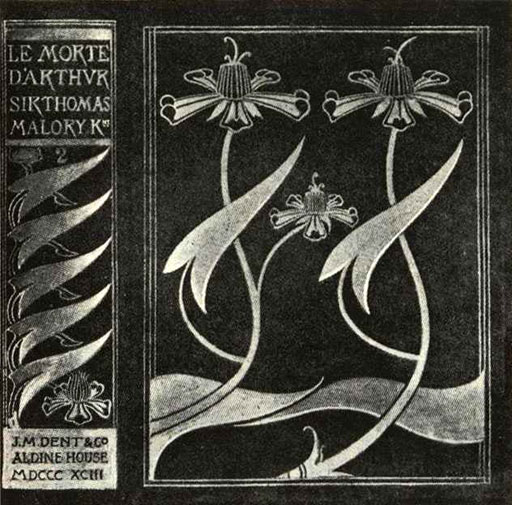
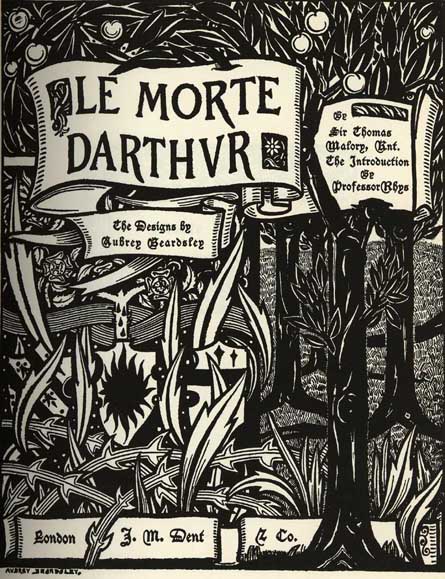
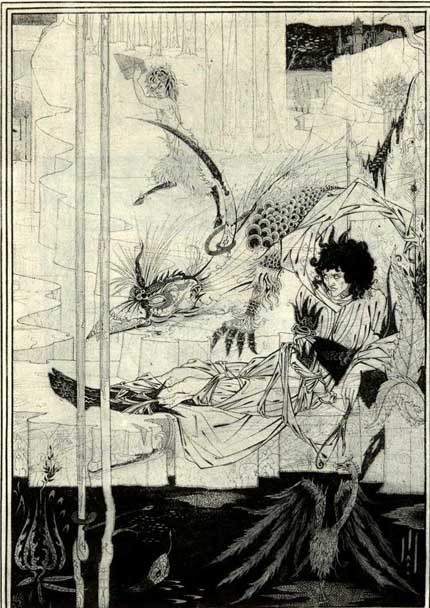
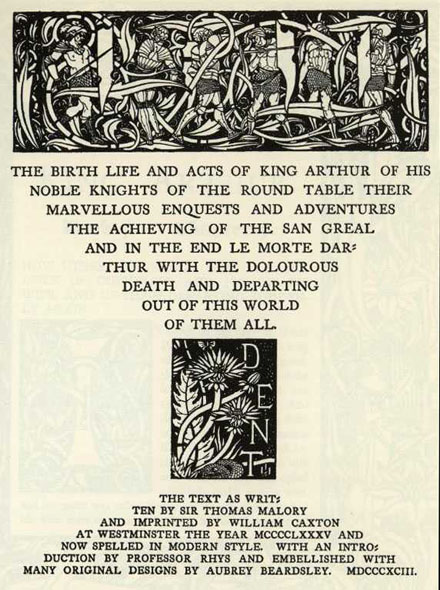
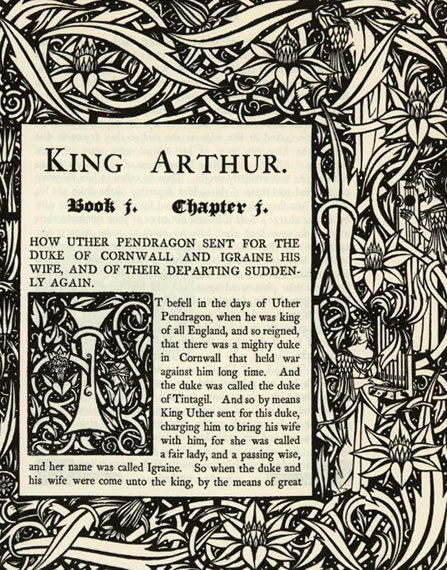
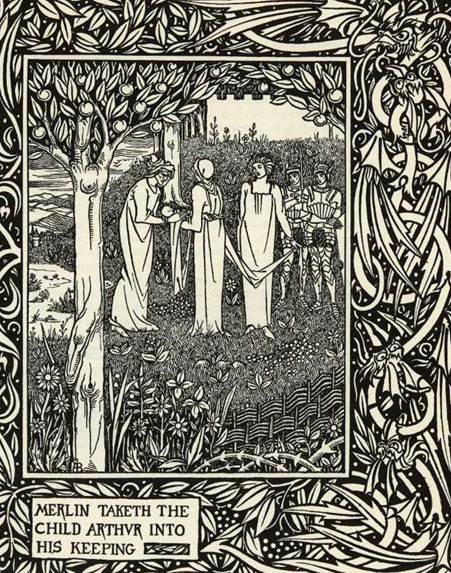
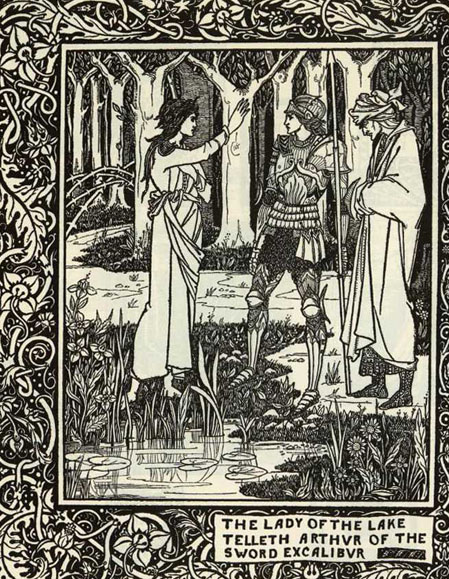
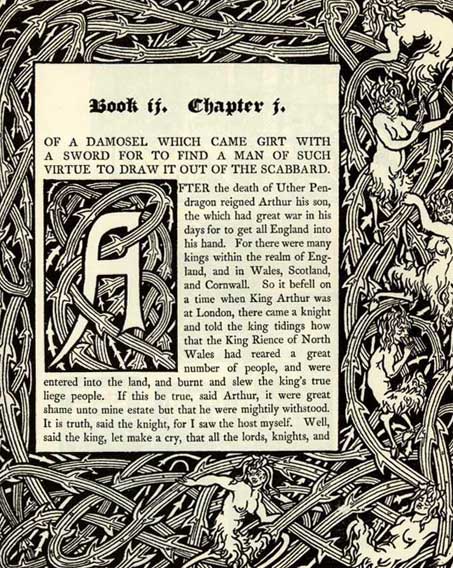
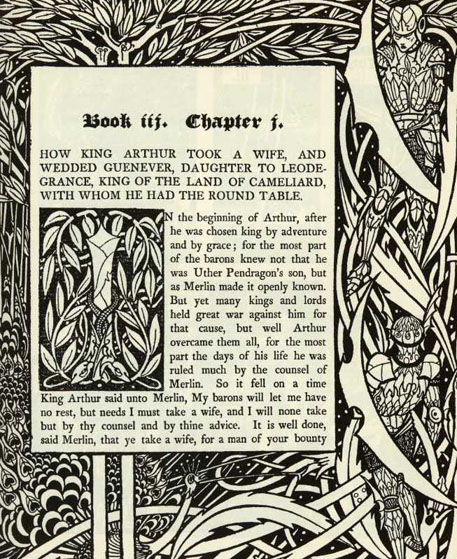
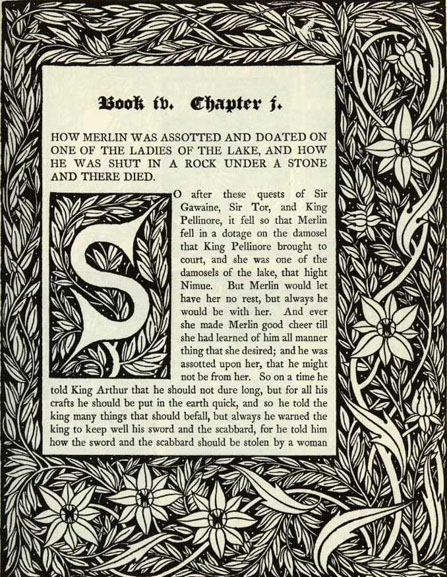
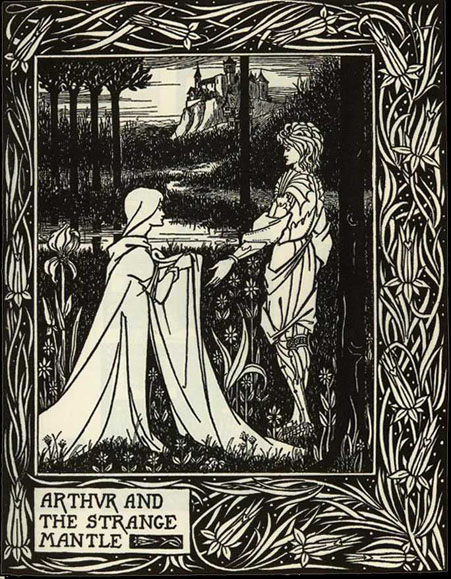
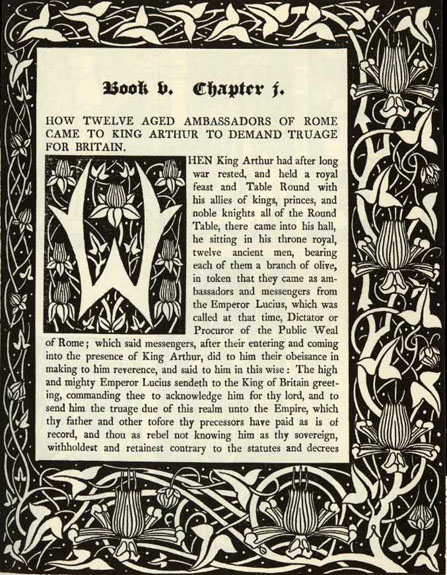
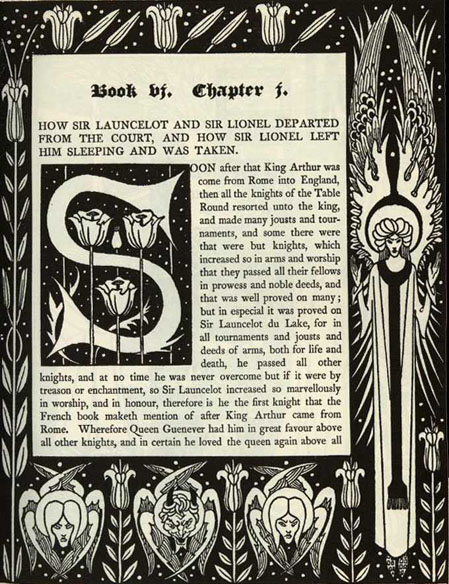
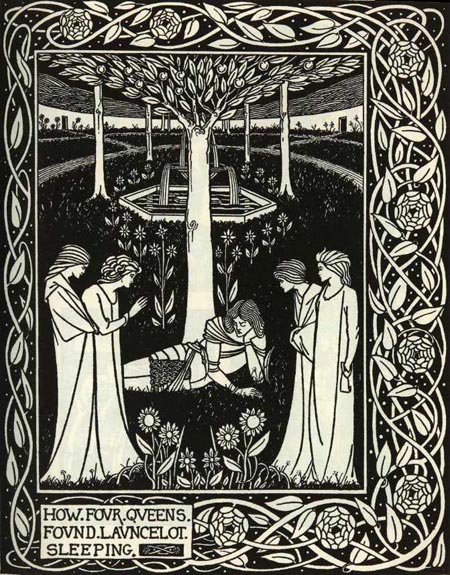
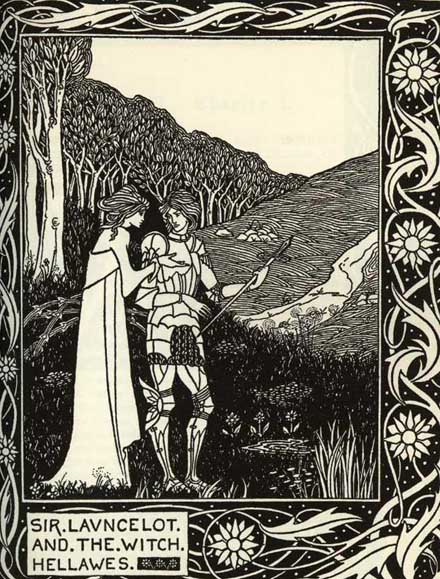
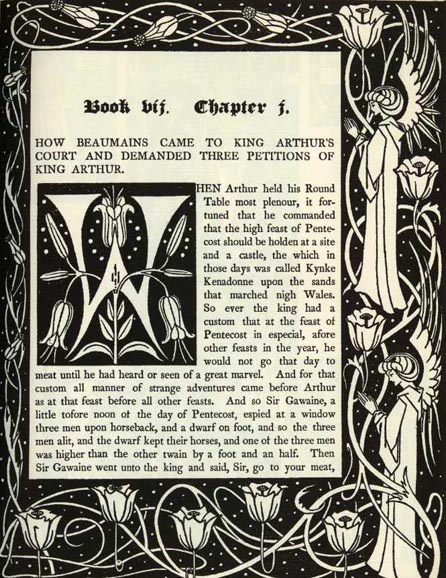
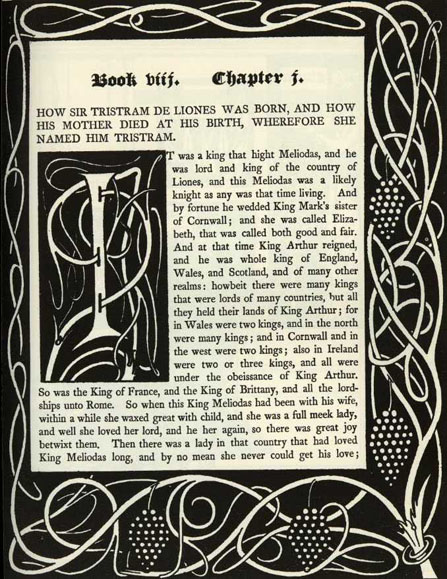
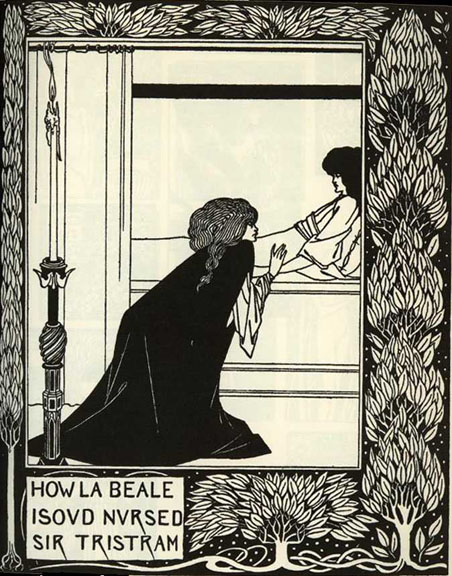
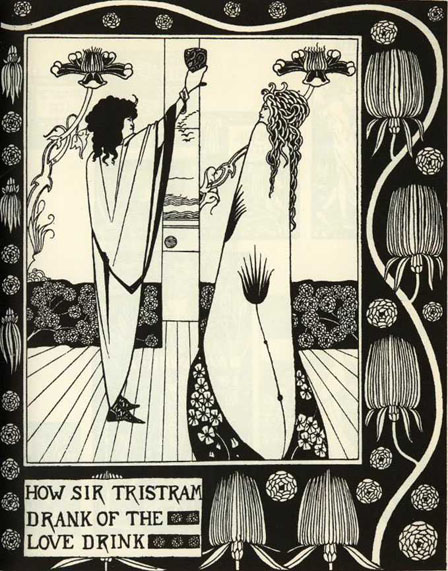
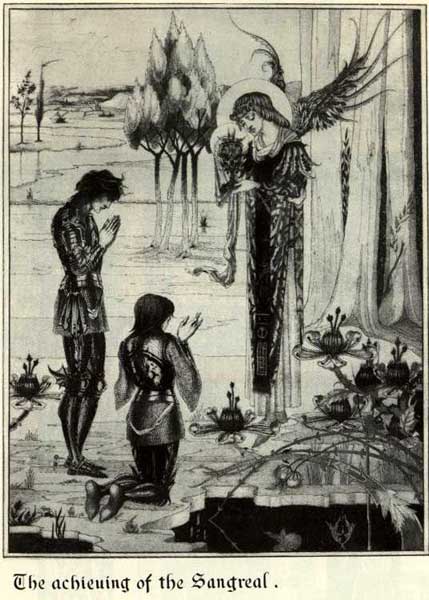
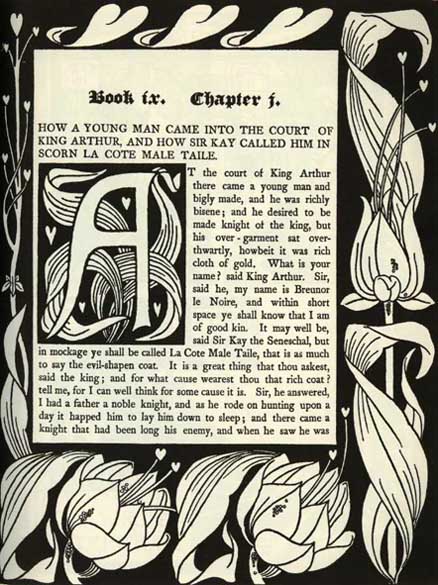
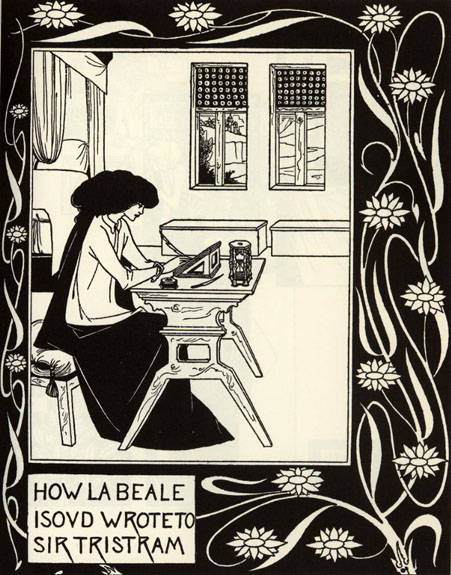
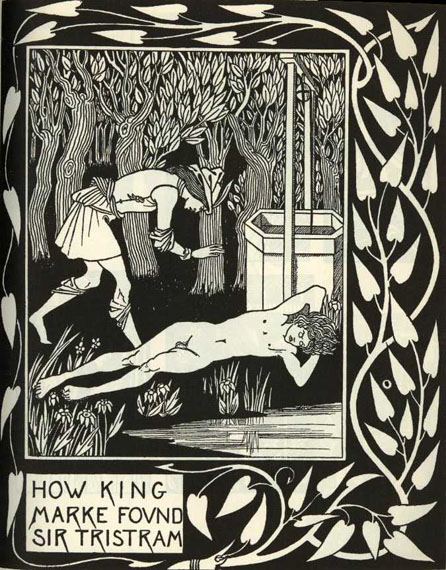
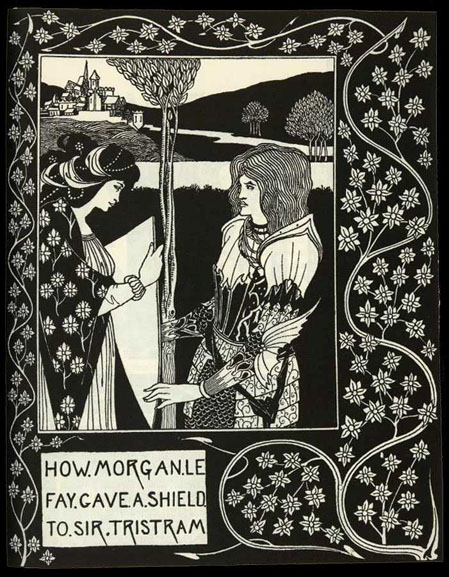
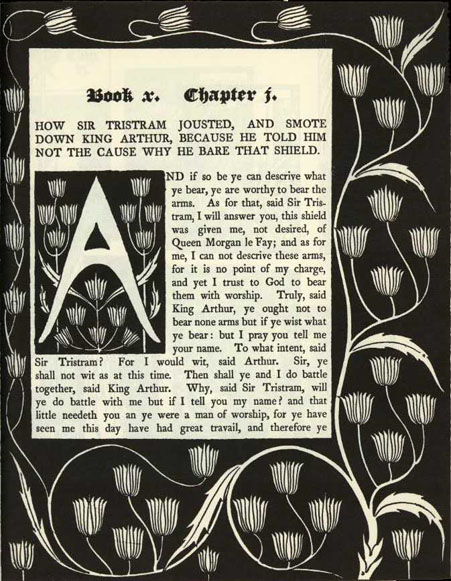
_Le_Morte_D_arthur.jpg)
_Le_Morte_D_arthur.jpg)
_Le_Morte_D_arthur.jpg)
_Le_Morte_D_arthur.jpg)
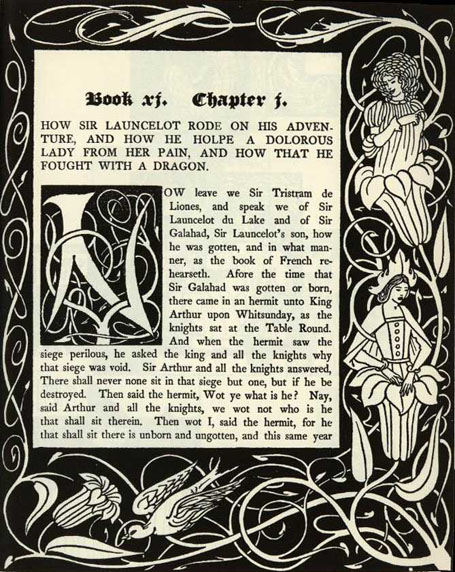
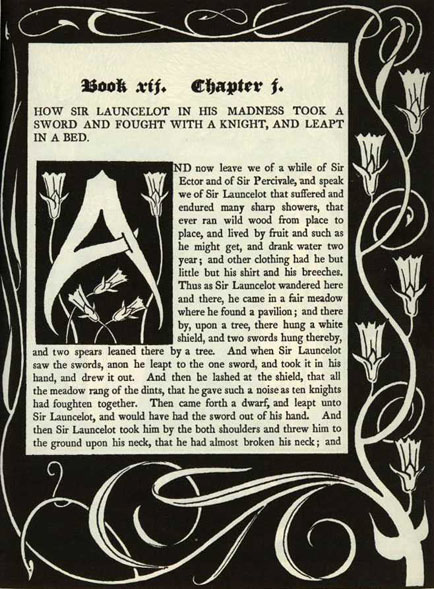
_Le_Morte_D_arthur.jpg)
_Le_Morte_D_arthur.jpg)
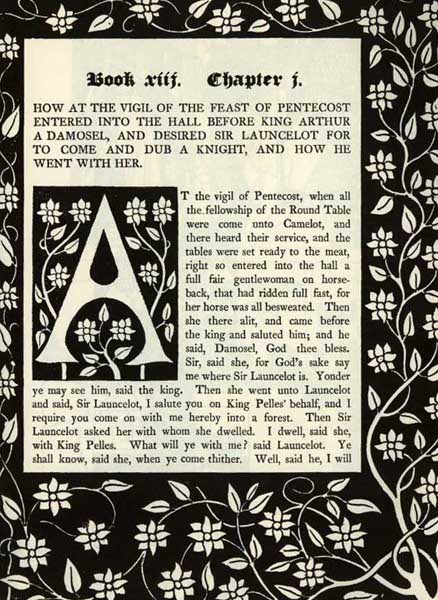
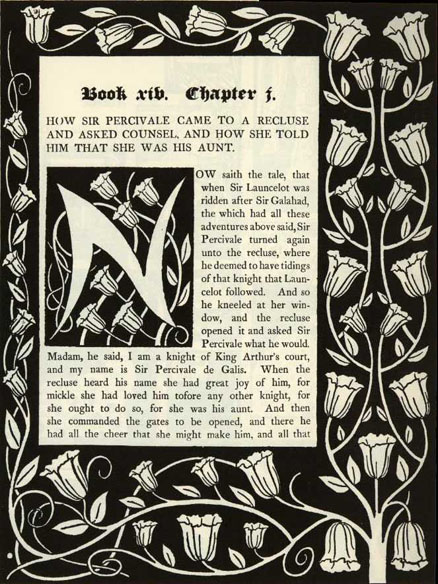
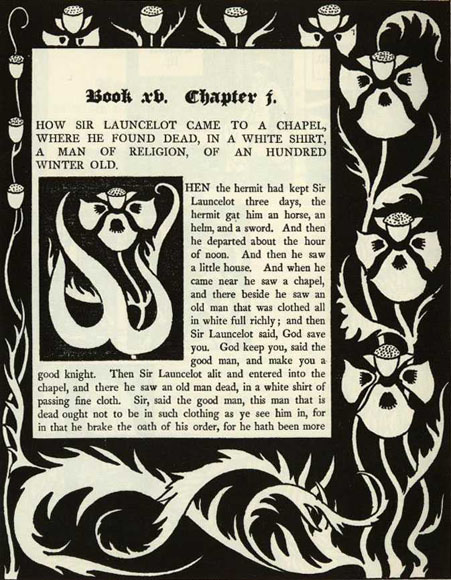
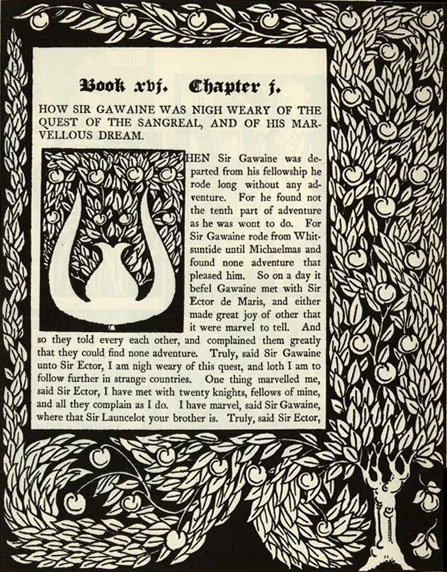
_Le_Morte_D_arthur.jpg)
_Le_Morte_D_arthur.jpg)
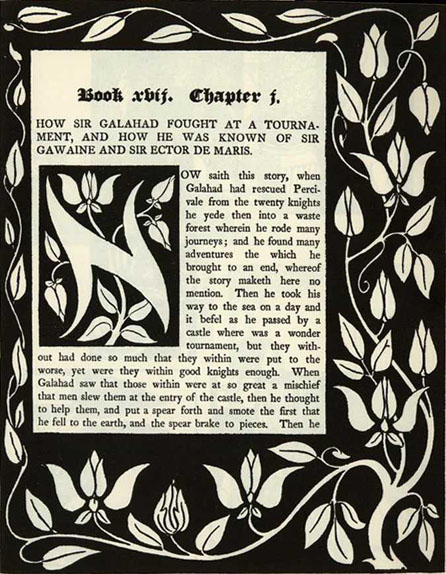
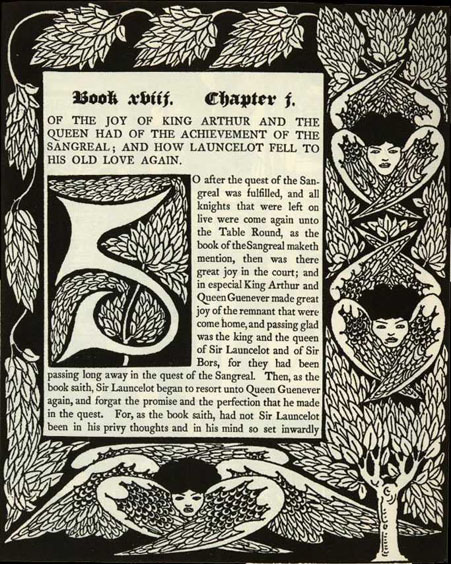
_Le_Morte_D_arthur.jpg)
_Le_Morte_D_arthur.jpg)
_Le_Morte_D_arthur.jpg)
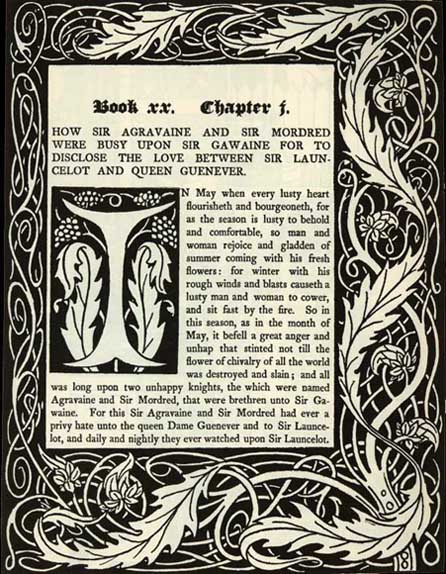
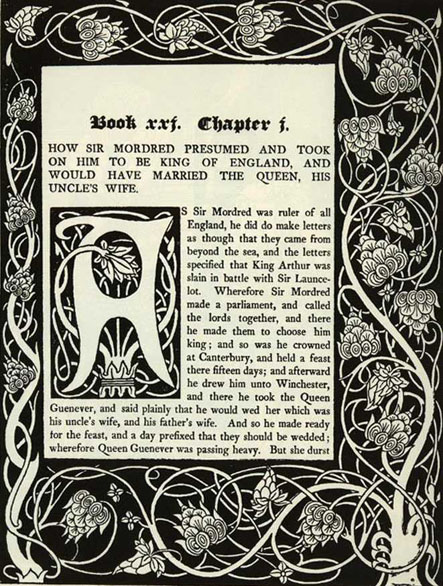
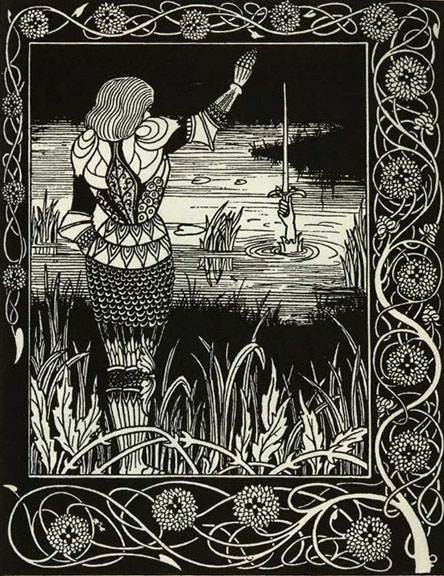
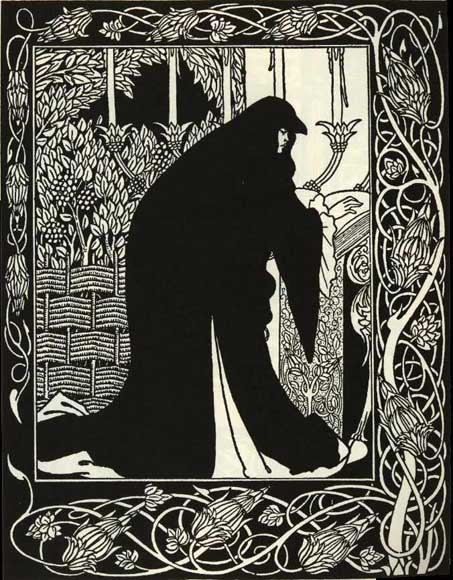
Also in 1893 the artist formed an alliance with the person who was to catapult him to fame and prove his downfall -- Oscar Wilde. In February of that year (1893), Wilde's scandalous play Salome was published in its original French version. An illustration inspired by the drama (reproduced in Joseph Pennell's article, "A New Illustrator: Aubrey Beardsley," in the inaugural issue of The Studio) was admired by Wilde and Beardsley was commissioned 50 guineas to Illustrate the English edition (1894). (Not content with art alone, Beardsley expressed an intense desire to translate the French text after Wilde found the translation by his intimate, Lord Alfred Douglas, to be unsatisfactory.) This assignment was the beginning of celebrity but also of an uneasy, and at times unpleasant, friendship with Wilde, which officially ended when Wilde was tried and convicted of sodomy in 1895.
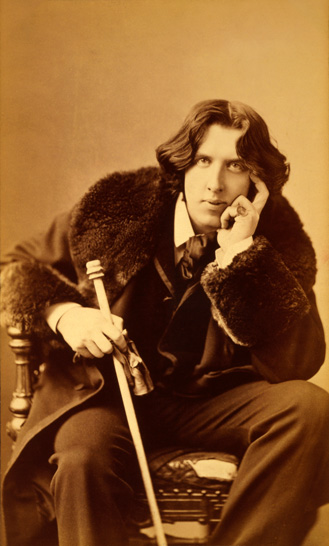
Beardsley's fame was established for all time when the first volume The Yellow Book appeared in April 1894. This famous quarterly of art and literature, for which Beardsley served as art editor and the American expatriate Henry Harland as literary editor, brought the artist's work to a larger public. It was Beardsley's starling black-and-white drawings, title-pages, and covers which, combined with the writings of the so-called "decadents," a unique format, and publisher John Lane's remarkable marketing strategies, made the journal an overnight sensation. Although well received by much of the public, The Yellow Book was attacked by critics as indecent. So strong was the perceived link between Beardsley, Wilde, and The Yellow Book that Beardsley was dismissed in April 1895 from his post as art editor following Wilde's arrest, even though Wilde had in fact never contributed to the magazine.
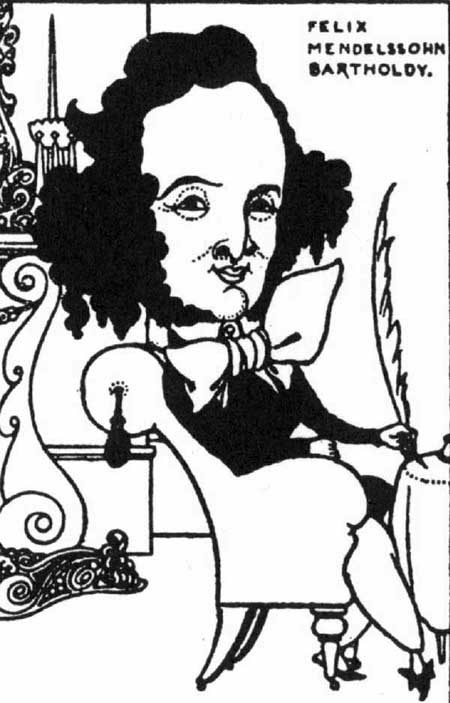
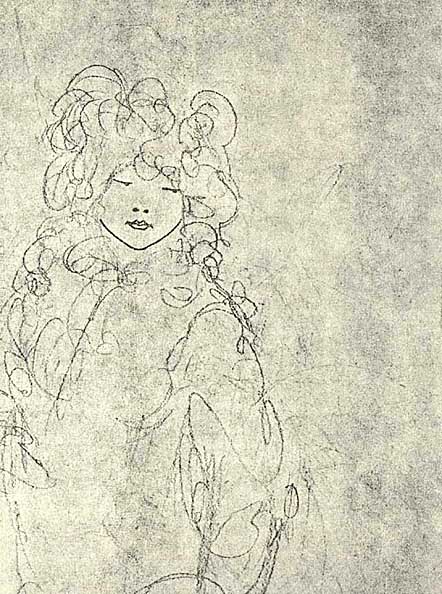
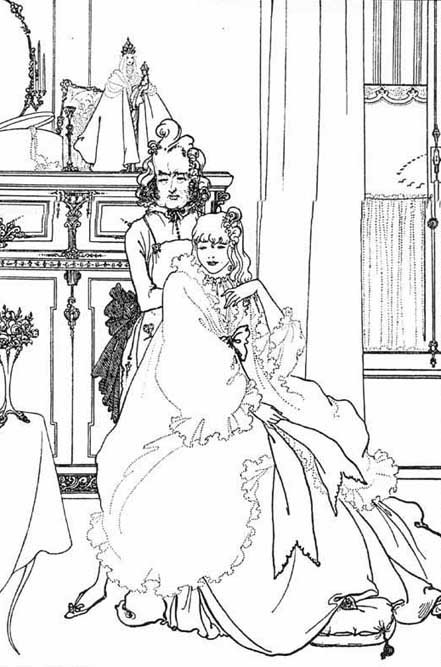
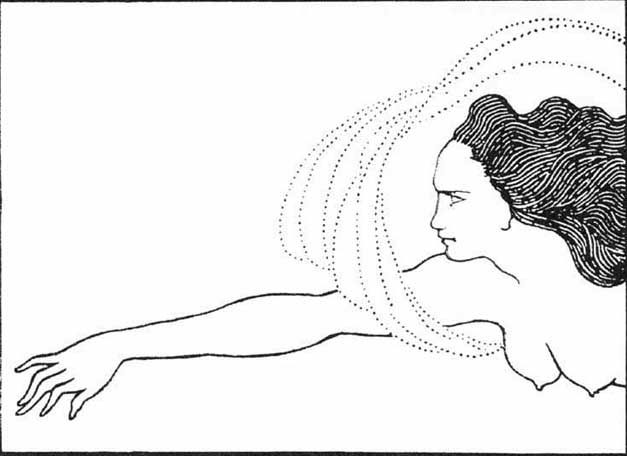
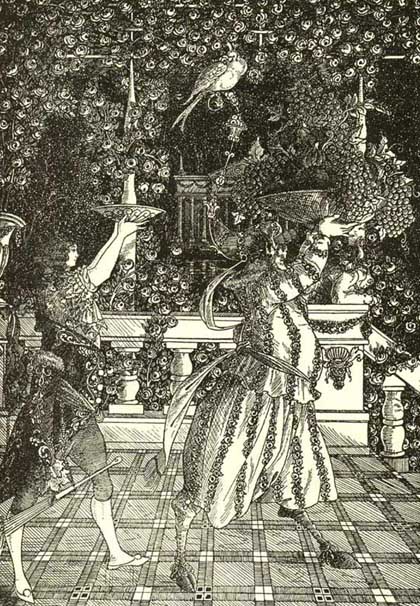
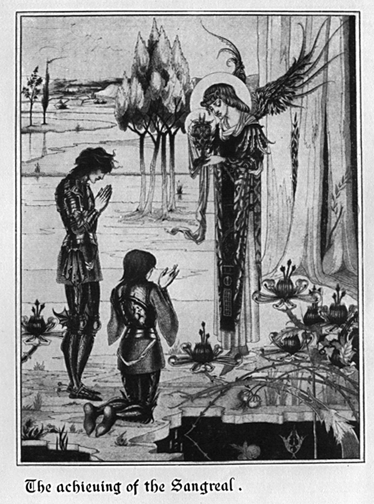
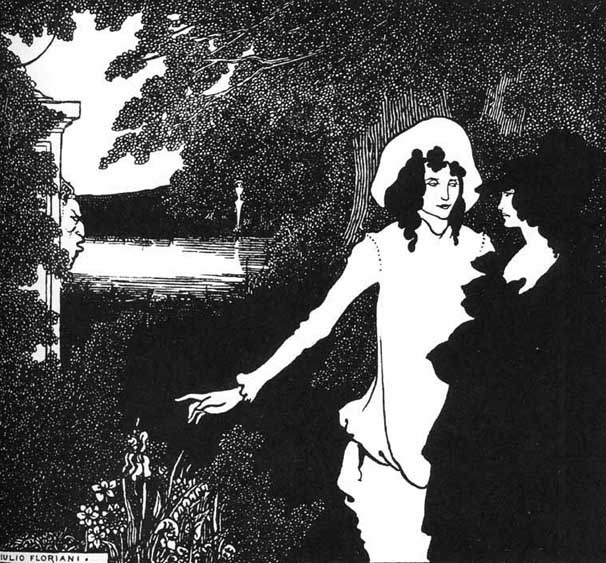
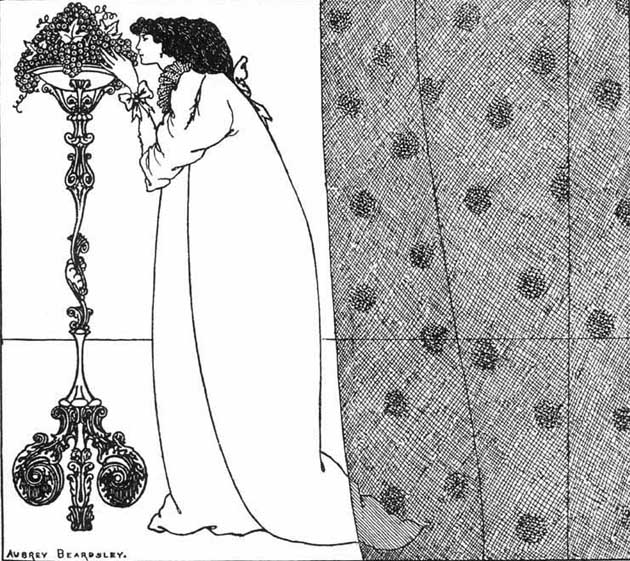
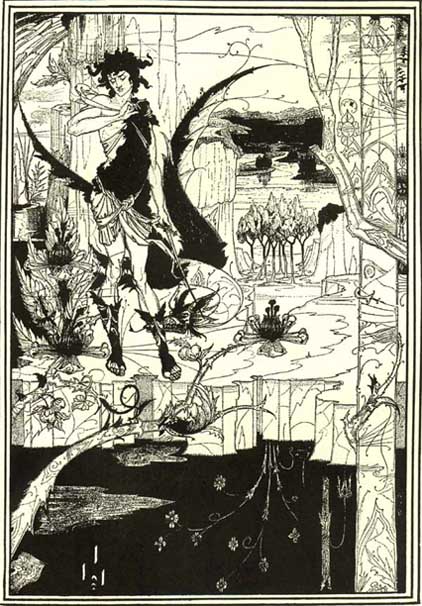
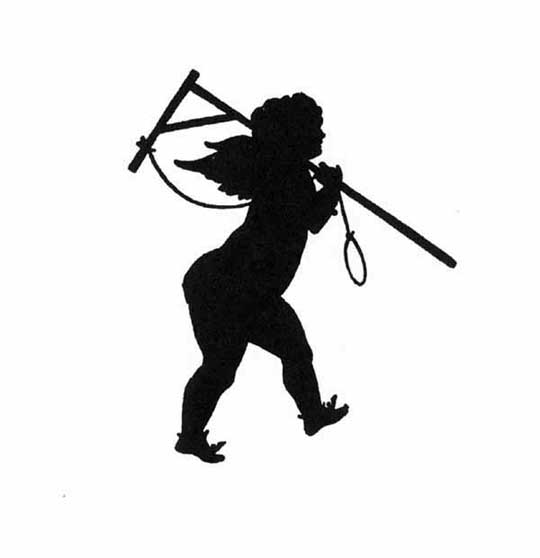
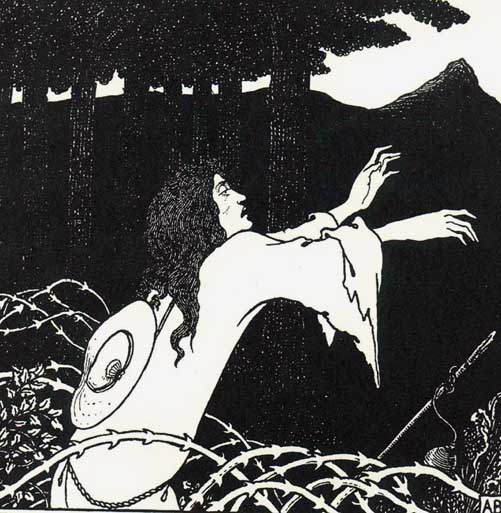
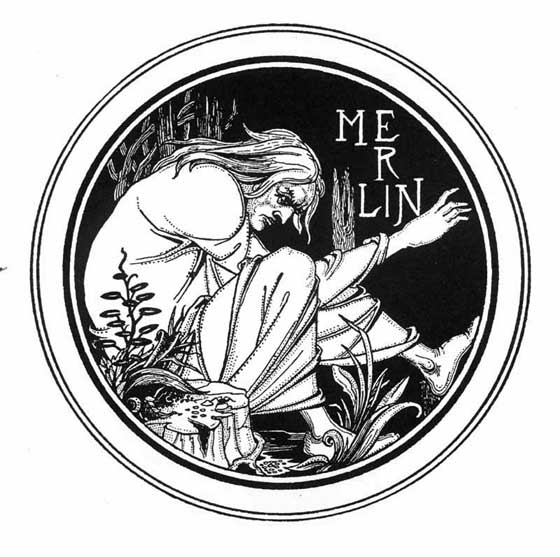
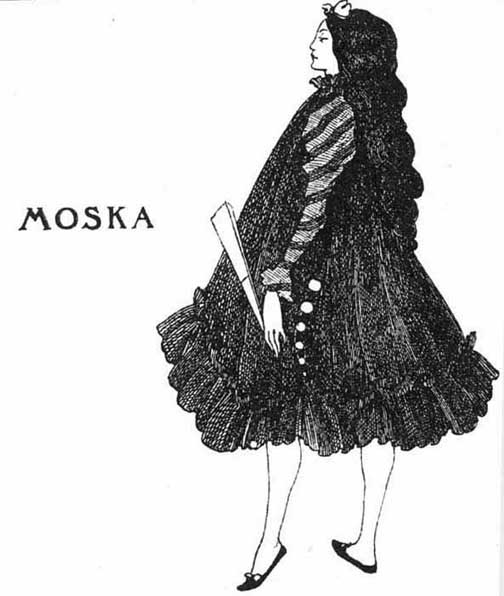
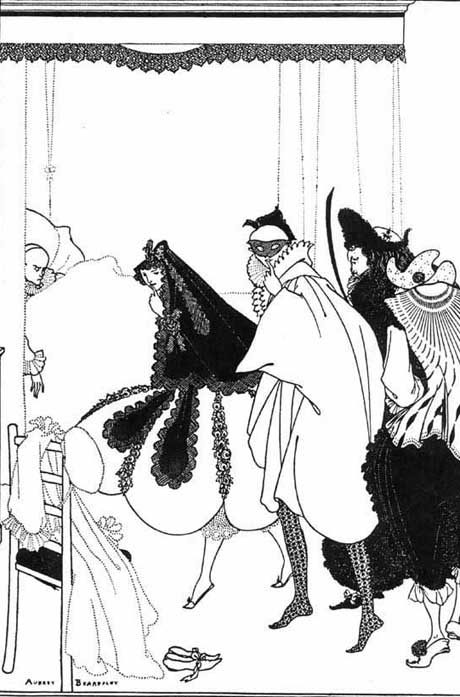
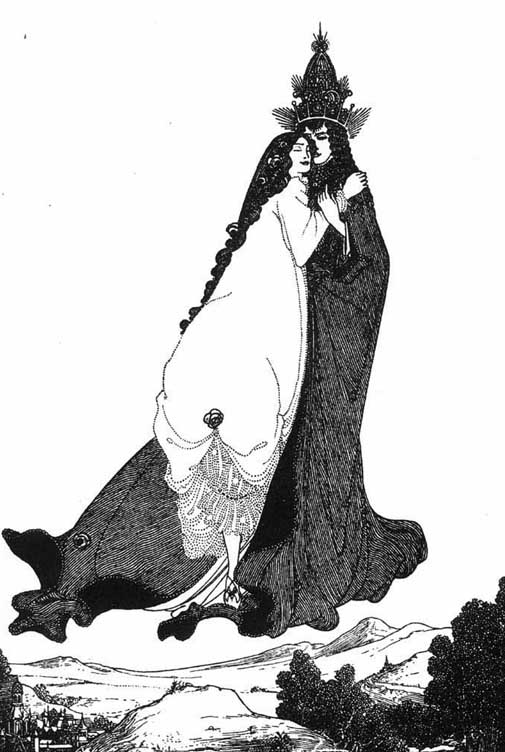
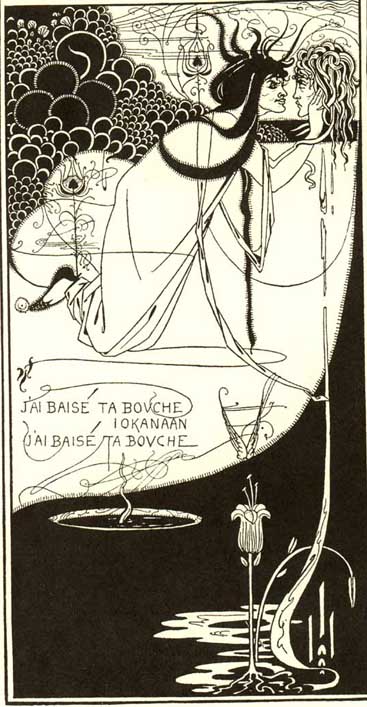
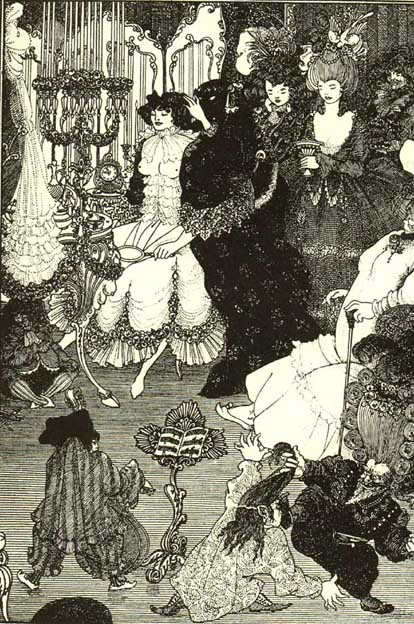
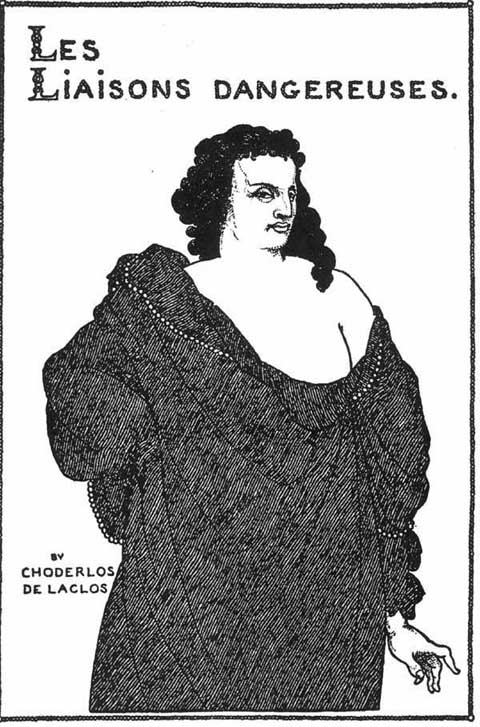
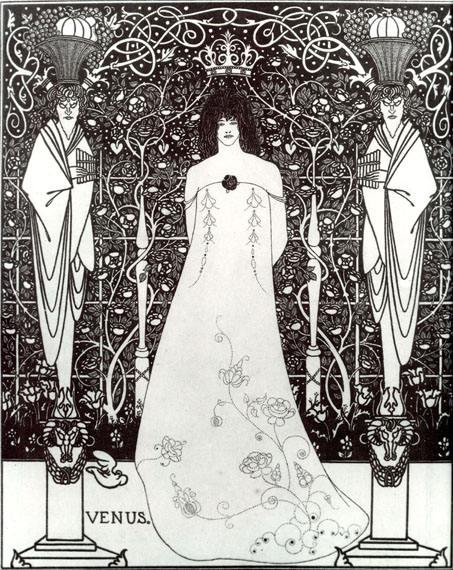
Soon after he was let go from The Yellow Book, Beardsley was approached by Leonard Smithers, a publisher intent on creating a rival periodical. Though (or perhaps because) Smithers was known for publishing pornography and erotica, Beardsley jumped at the chance, and so The Savoy was created, with Arthur Symons as editor. Beardsley found in The Savoy an outlet for his writings as well as art. "Under the Hill" (his version of the Tannhauser legend) and "The Ballad of a Barber" both appeared in numbers of The Savoy. When publication ceased in December 1896, Beardsley continued to illustrate other authors' works for Smithers. Among these volumes were editions of Pope's The Rape of the Lock, Ben Jonson's Volpone, and The Lysistrata of Aristophanes). Smithers also issued Beardsley's own A Book of Fifty Drawings, the first collected album of his work.
In the hope that the climate might improve his deteriorated condition Beardsley followed doctor's advice and traveled to the south of France. Realizing his short time left to live, he converted to Catholicism. During the night of 15-16 March 1898, exiled in the same country as Oscar Wilde, he died at the age of 25.
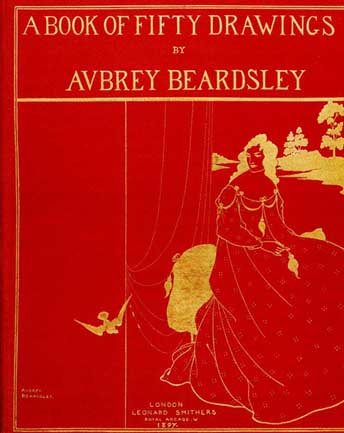
These are the naughty images that kids like to giggle at. Actually, I giggle, too.
Aubrey Beardsley was not at home in the Victorian society in which he lived. These images poke fun at that society and its values. He did make people think. Although most of his drawing were for books or magazines seen by few people, his erotic and haunting drawings have been well known for more than a hundred years.
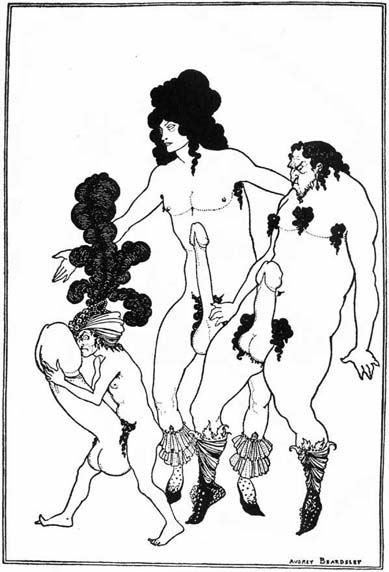
Here come the Spartan envoys with long, worried beards.
Hail, Spartans how do you fare?
Did anything new arise?
SPARTANS
No Need for a clutter o'words. Do ye see our condition?
CHORUS
The situation swells to greater tension.
Something will explode soon!
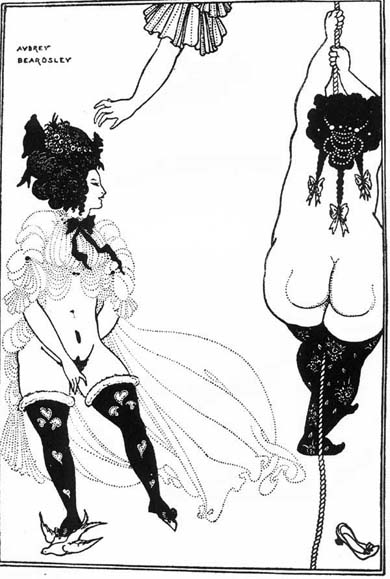
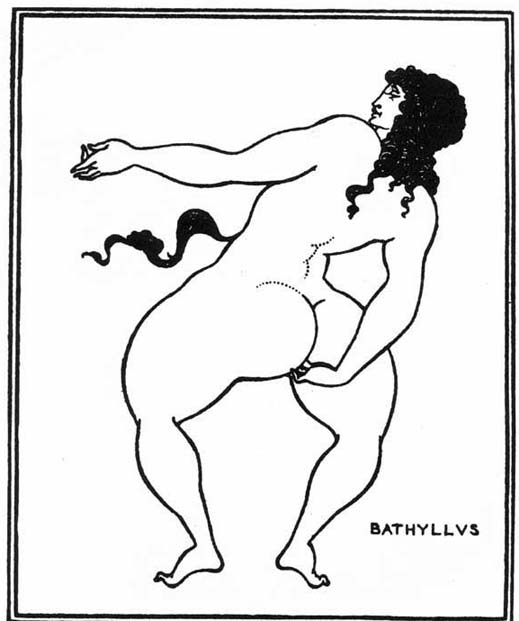
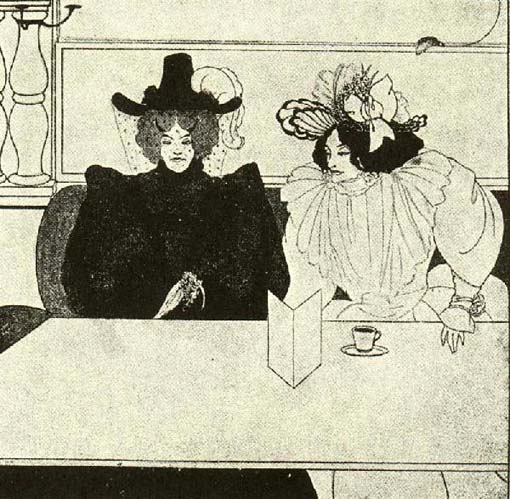
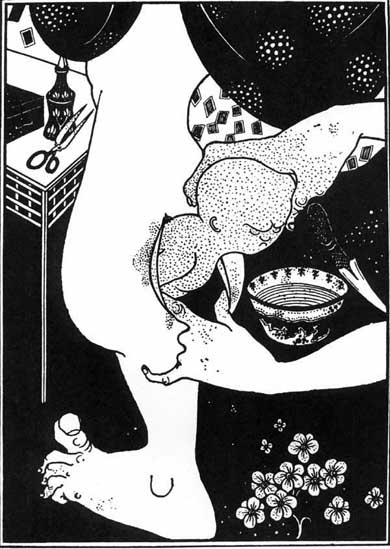
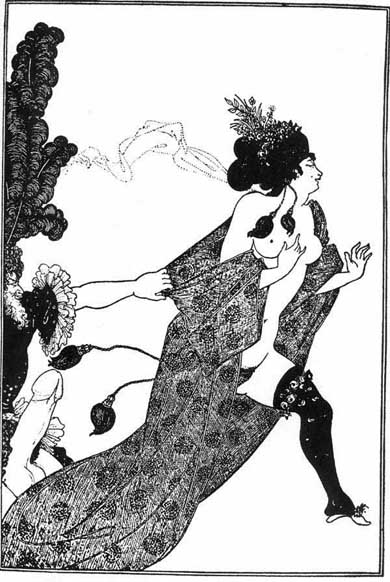
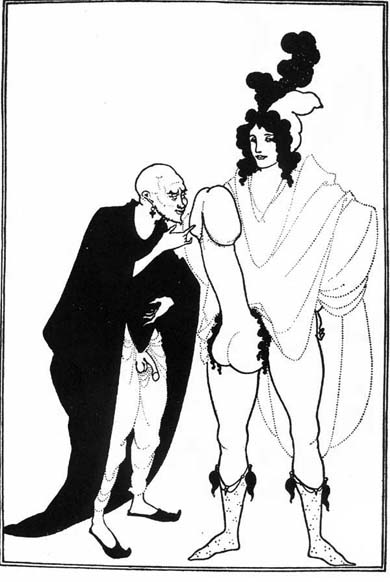
Are you a man or a Priapus?
HERALD
Don't be stupid! I am a herald, of course, I swear I am, and I come from Sparta about making peace.
MAGISTRATE
But look, you are hiding a lance under your clothes, surely.
HERALD
No, nothing of the sort.
MAGISTRATE
Then why do you turn away like that, and hold your cloak out from your body? Have you got swellings in the groin from your journey?
HERALD
By the twin brethren! the man's an old maniac.
MAGISTRATE
But you've got an erection! You lewd fellow!
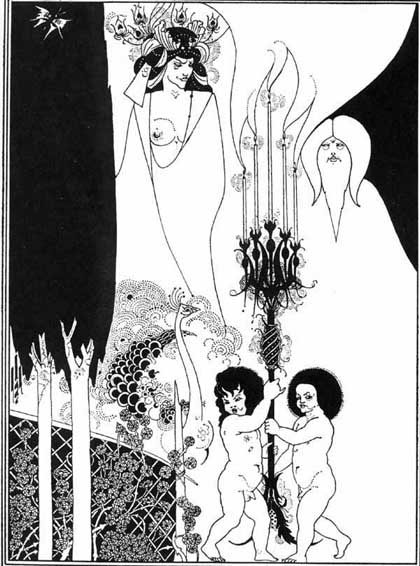
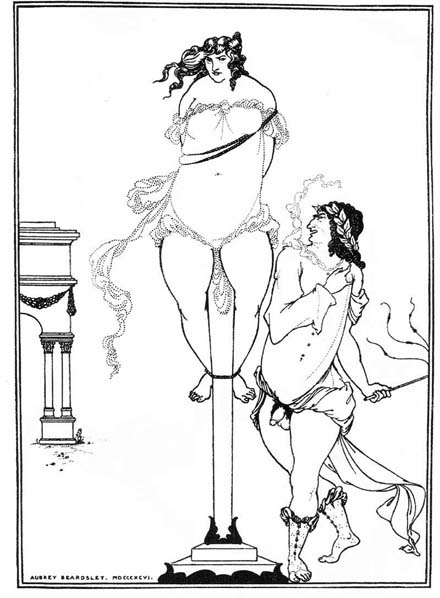
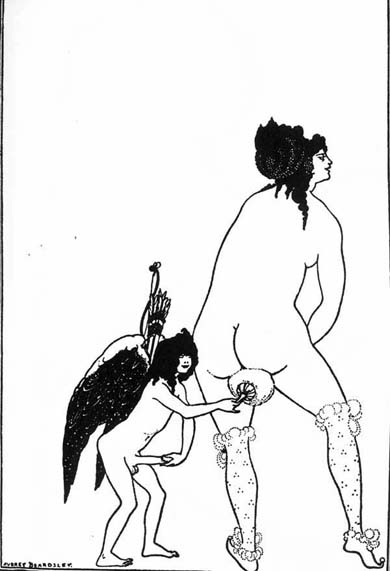
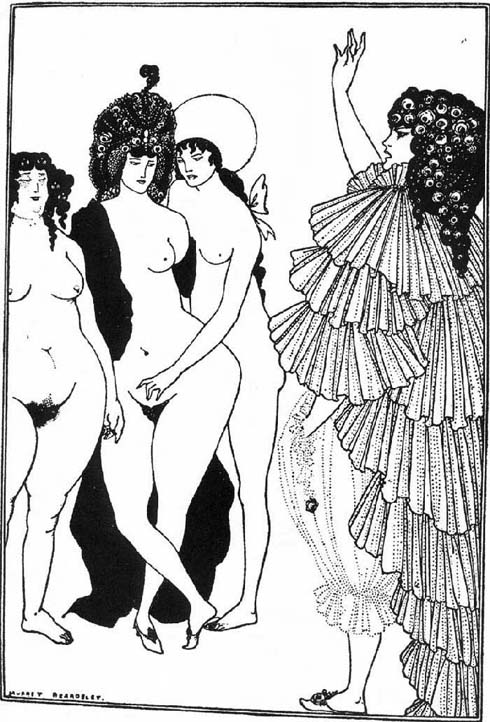
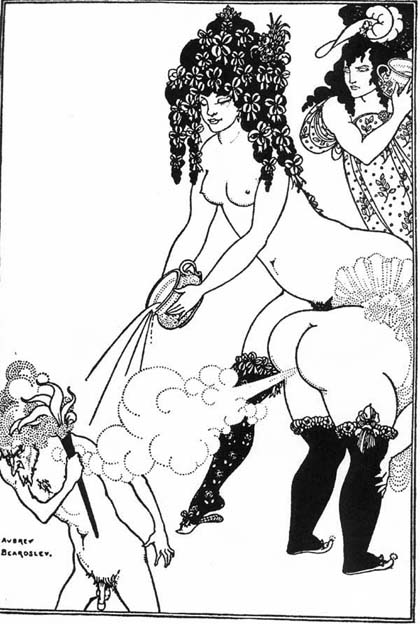
By the Goddesses, you'll find that here await you
Four companies of most pugnacious women
Armed cap-a-pie from the topmost louring curl
To the lowest angry dimple
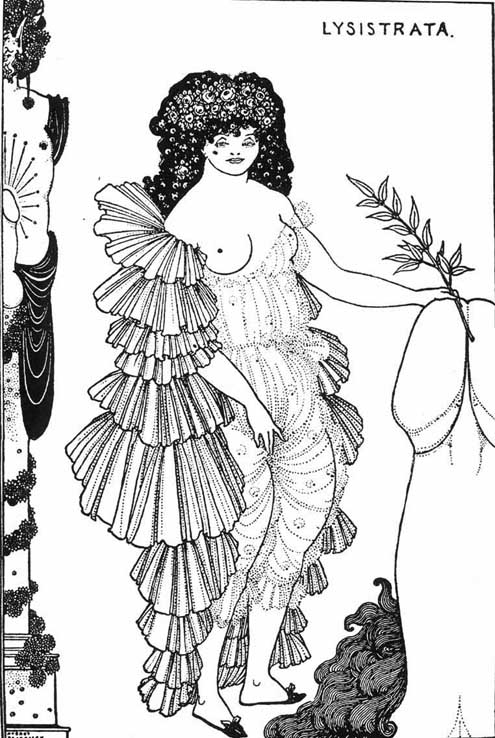
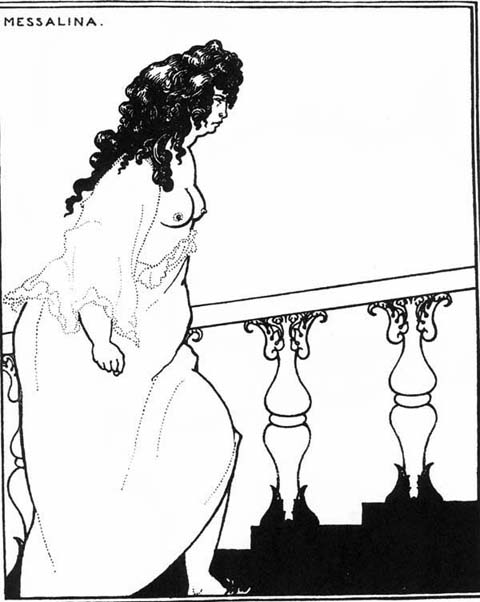
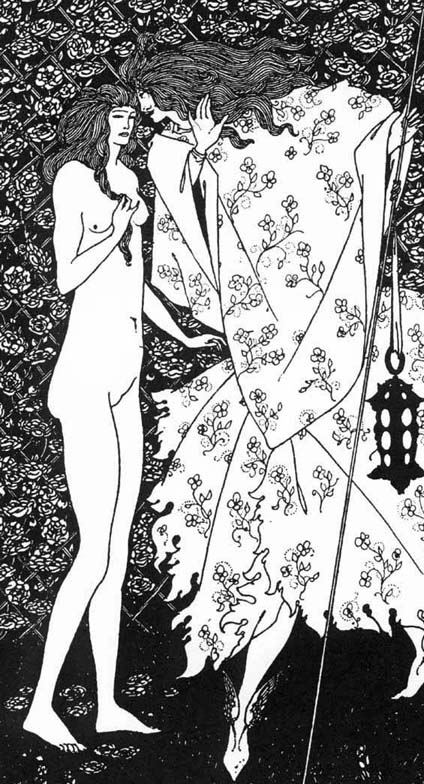
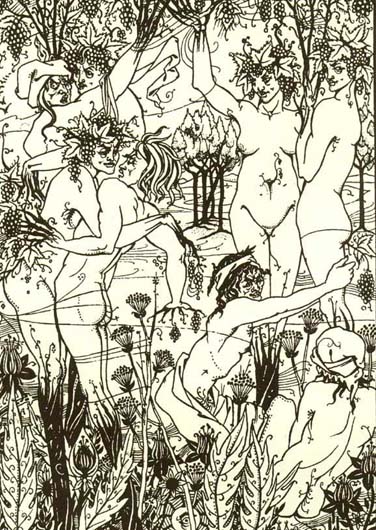
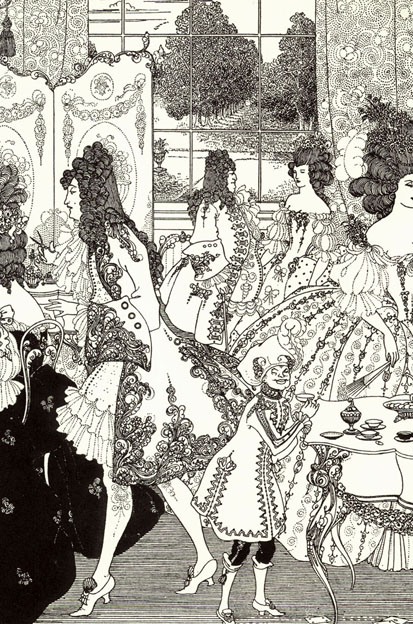
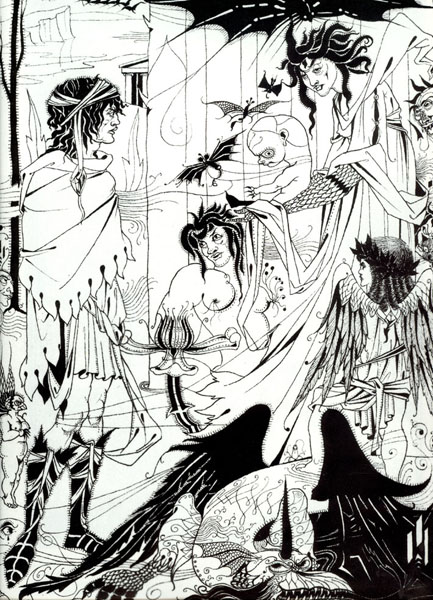
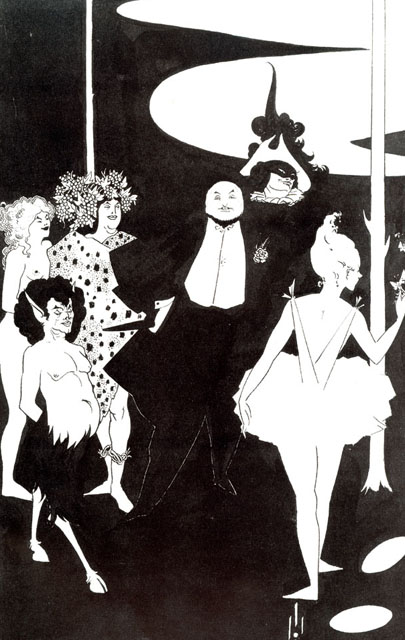
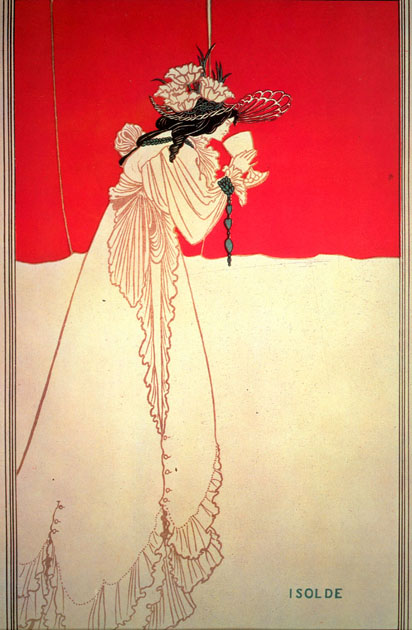
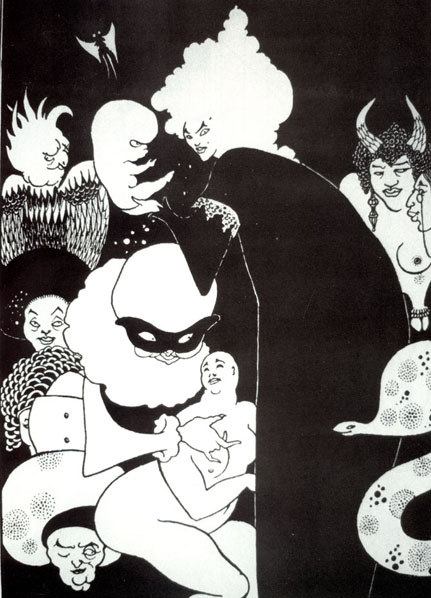
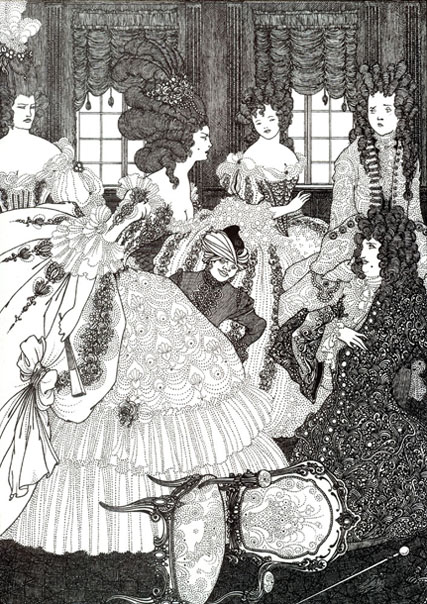
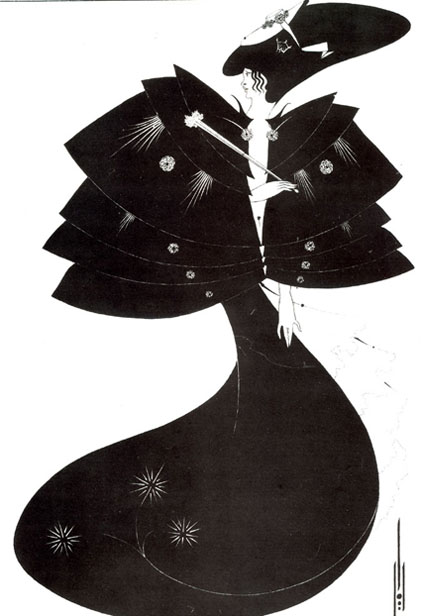
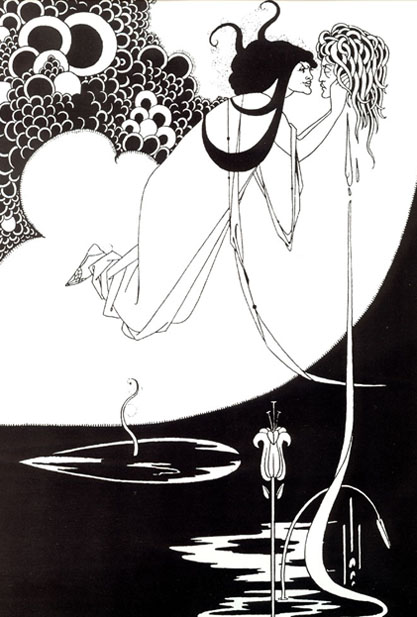
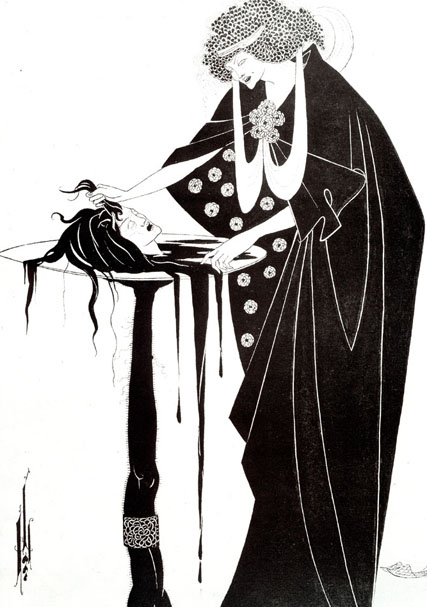
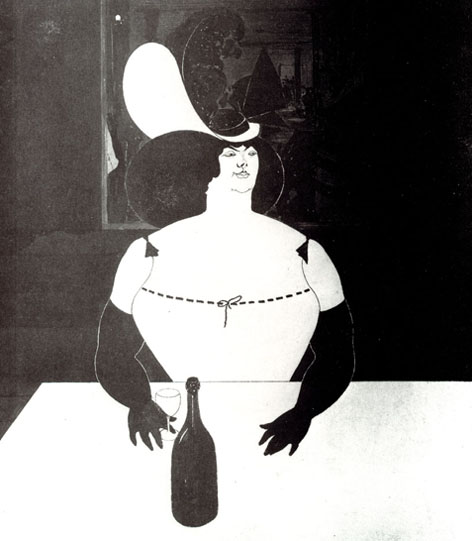
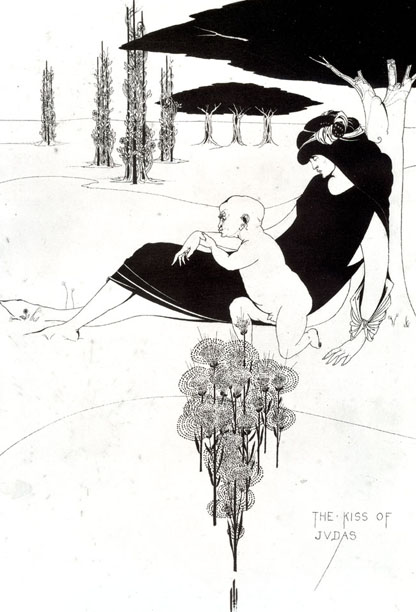
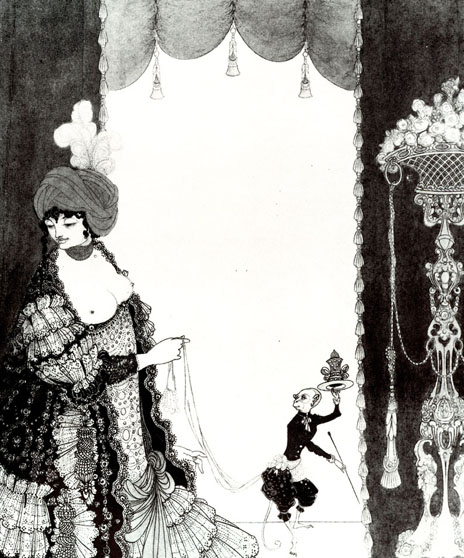
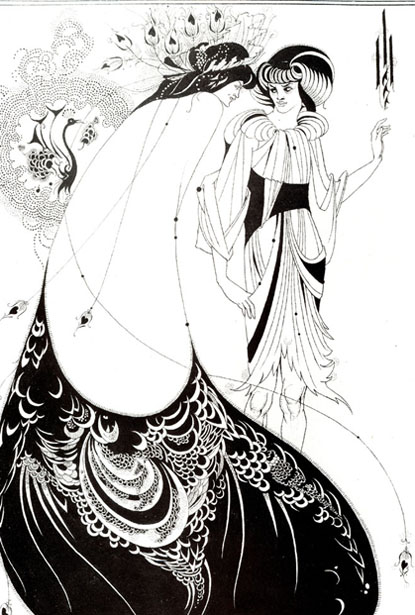
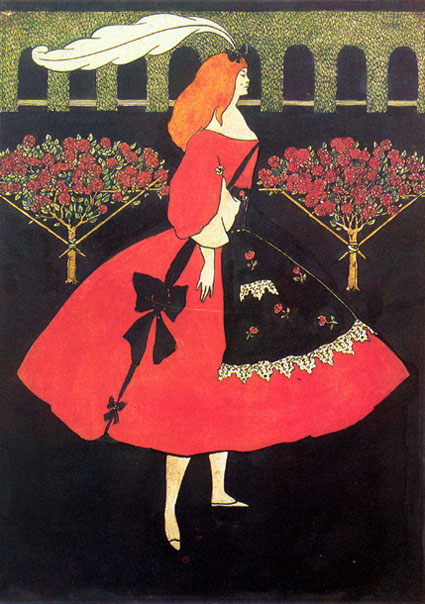
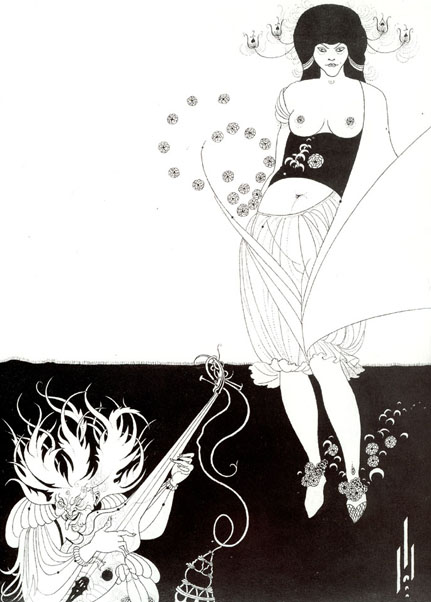
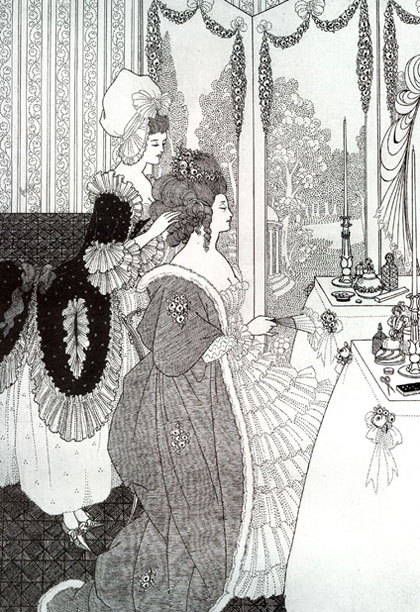
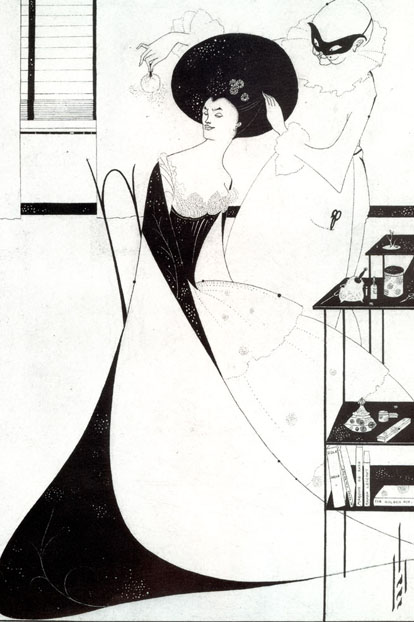
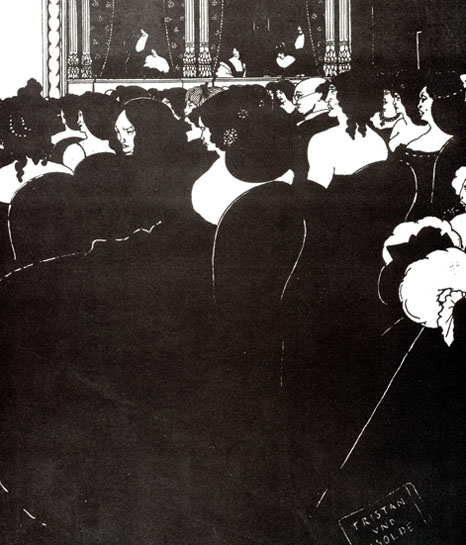
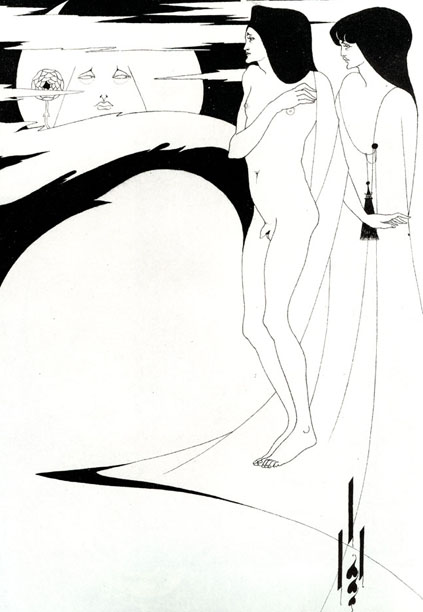
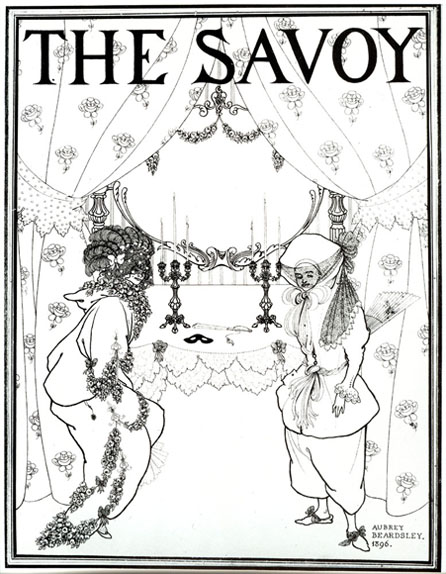
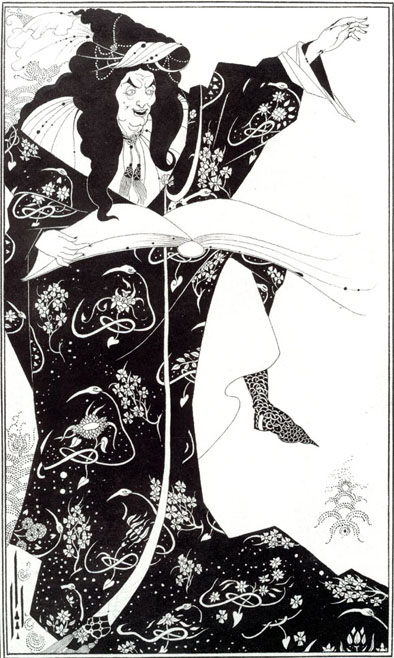
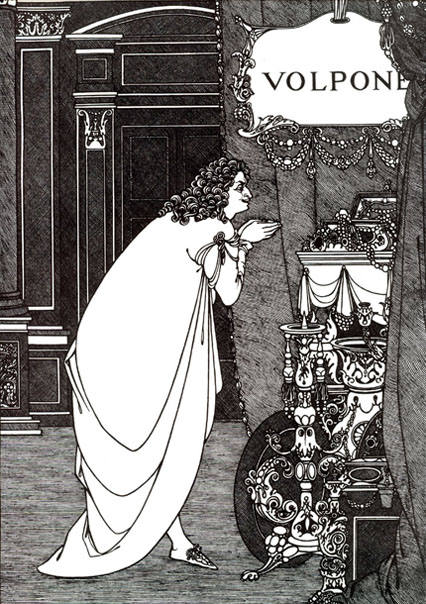
Source: Art Renewal Center
Source: Aubrey Beardsley Online
Return to Pagina Artis
Return to Bruce and Bobbie's Main Page.